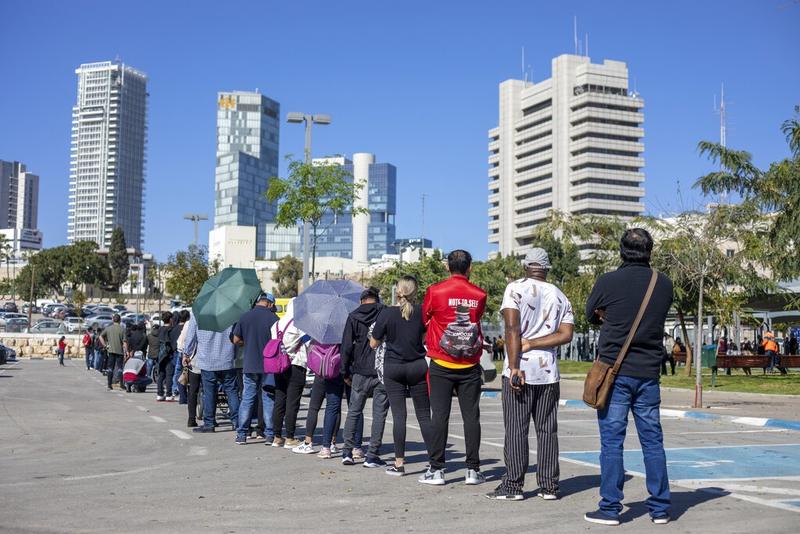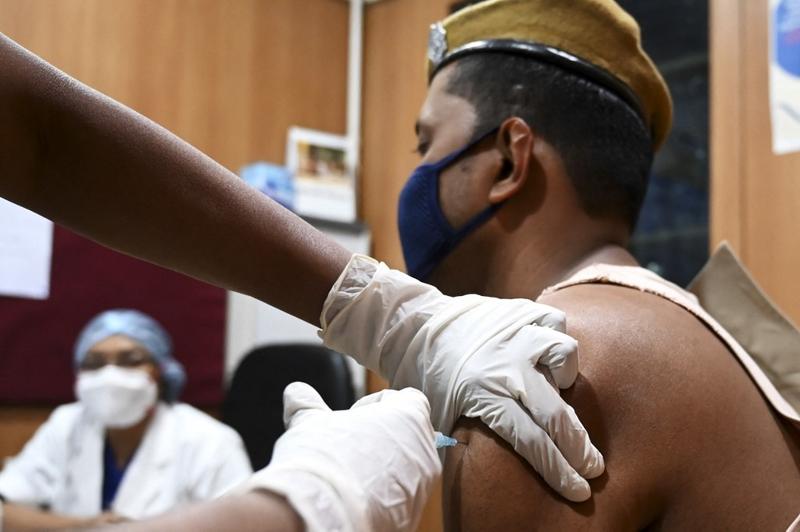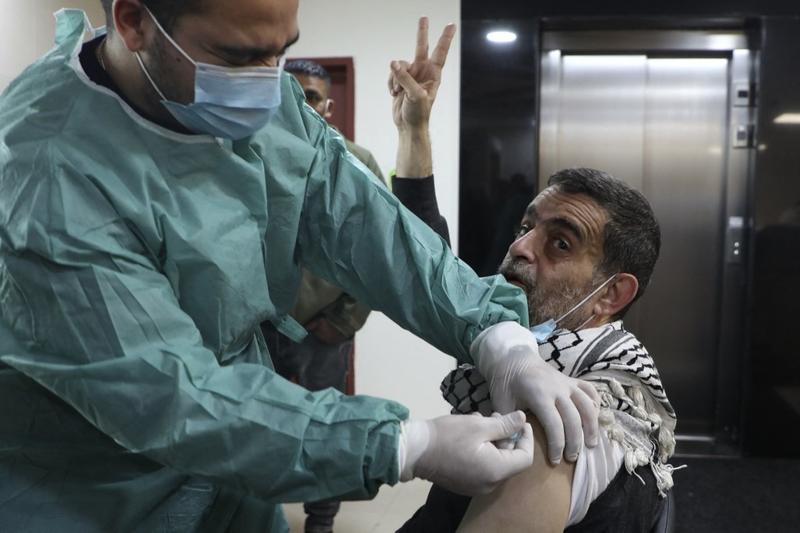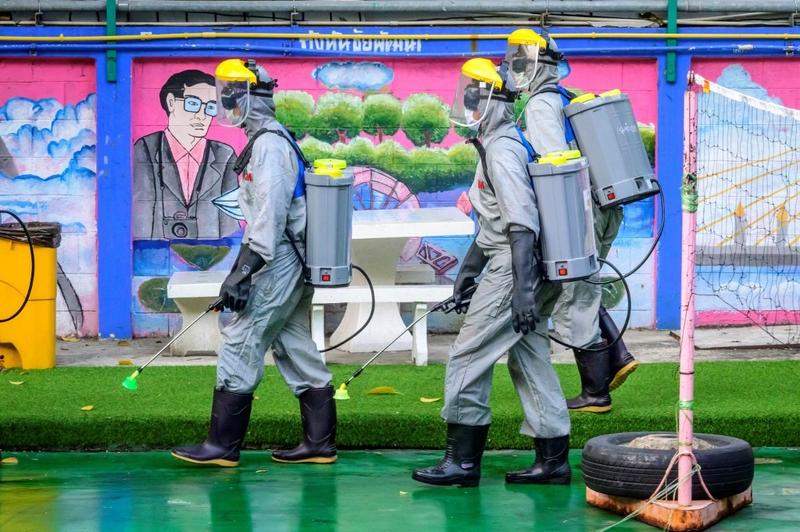 Asylum seekers and foreign workers wait in line to receive their first doses of the Pfizer-BioNTech coronavirus vaccine at a vaccination center in Tel Aviv, Israel, Feb 9, 2021. (ARIEL SCHALIT / AP)
Asylum seekers and foreign workers wait in line to receive their first doses of the Pfizer-BioNTech coronavirus vaccine at a vaccination center in Tel Aviv, Israel, Feb 9, 2021. (ARIEL SCHALIT / AP)
TEHRAN / CANBERRA / BANDAR SERI BEGAWAN / NEW DELHI / BAGHDAD / JERUSALEM / KUWAIT CITY / BEIRUT / YANGON / WELLINGTON / MUSCAT / RAMALLAH / DOHA / SINGAPORE / SEOUL / BANGKOK / MANILA / CAIRO / KUALA LUMPUR / ISTANBUL / HANOI / DHAKA / DOHA - Israel’s Health Ministry is promoting legislation that would require teachers, transportation workers and salespeople to get vaccinated or take frequent COVID-19 tests as a condition to work, according to Deputy Health Minister Yoav Kisch.
The pace of vaccination has slowed in Israel, whose vaccine drive is the world’s leader, with 40 percent of the population inoculated. Cases are now coming down as the country gradually starts to emerge this week from its third lockdown.
The Ministry of Health reported 5,725 new COVID-19 cases on Wednesday, raising the tally to 708,827. Deaths rose by 42 to 5,244.
Kisch is hoping for swift enactment of vaccination requirements, but any new legislation would have to be passed by parliament, which has been deeply divided over how stringent pandemic regulations should be.
He also said proof of vaccination, recovery from coronavirus or a recent negative test may become a requirement to visit malls, gyms, restaurants and shows once they reopen.

Afghanistan
Afghanistan registered 25 new COVID-19 cases over the past 24 hours, bringing the infection tally to 55,445, the Public Health Ministry said in a statement on Thursday.
According to the statement, five more deaths were recorded while another 146 patients have recovered, taking the number of the recoveries to 48,279.
Australia
Authorities in Australia stepped up contact tracing and called for people in the city of Melbourne to come forward for coronavirus testing on Thursday as the number of infections in a cluster linked to a quarantine hotel rose to 11.
More than 22,500 tests were done in the previous 24 hours in Australia’s second most populous city and authorities scrambled to contain the spread of a highly transmissible variant of the virus from workers at a Holiday Inn.
Three new cases were reported on Thursday, a manager at the hotel and the spouses of two members of staff, Victoria state authorities said.
All 11 cases in the cluster were confirmed to have the variant of the virus that emerged in Britain.
 A man walks past the Grand Hyatt hotel in Melbourne on Feb 4, 2021. (WILLIAM WEST / AFP)
A man walks past the Grand Hyatt hotel in Melbourne on Feb 4, 2021. (WILLIAM WEST / AFP)
British scientists have said the UK variant of the virus that is behind a surge in infections there may be not only more transmissible, but also more lethal - with a mortality risk around 30 percent higher than other variants.
The outbreak in Melbourne, where the Australia Open tennis tournament is underway, has raised fears of a new wave of infections in the state hardest hit by COVID-19.
ALSO READ: Thailand to begin human trials for COVID-19 vaccine in March
Bangladesh
Bangladesh reported 418 new COVID-19 cases and nine more deaths on Thursday, bringing the tally to 539,571 and the death toll to 8,248, the Directorate General of Health Services (DGHS) said.
The total number of recoveries rose to 485,971 after 681 new ones were added, said the DGHS.
Brunei
Brunei reported one new imported case of COVID-19 on Thursday, bringing the overall infection tally to 184.
With the detection of this latest case, a total of 43 imported cases have been confirmed since the last local infection case on May 6, 2020. At present, Brunei has recorded 281 days without COVID-19 local infection cases.
Brunei's Ministry of Health said in a press release on Wednesday that the country received a batch of Sinopharm COVID-19 vaccine donated by China on Tuesday and is reviewing a vaccination program.
The ministry said they are still reviewing the plans for the distribution of the vaccine in accordance with the recommended priorities.
India
Prime Minister Narendra Modi said on Wednesday he had assured Canadian counterpart Justin Trudeau that India would do its best to supply Canada with vaccines to fight the COVID-19 pandemic, potentially easing shortages faced in the country.
India, which boasts several vaccine manufacturing facilities, is fast emerging as a key supplier of shots to the world. Canada does not yet have a vaccine manufacturing facility of its own and is reliant on foreign suppliers.
“Was happy to receive a call from my friend @JustinTrudeau. Assured him that India would do its best to facilitate supplies of COVID vaccines sought by Canada,” Modi said in a tweet.
Pfizer Inc and Moderna Inc have reduced the number of COVID-19 vaccines being delivered to Canada in February.
Last week, Trudeau said that Canada would succeed in inoculating its population despite “momentary disruptions” in vaccine supply and reiterated that every Canadian seeking a shot would be vaccinated by the end of September.
India's COVID-19 tally rose to 10,871,294 on Thursday as 12,923 new cases were registered during the past 24 hours, said the latest data from the federal health ministry.
According to the official data, the death toll mounted to 155,360 as 108 COVID-19 patients died since Wednesday morning.
This is the first day in past several weeks when the number of new COVID-19 cases has shown a rise. Only two days ago, Tuesday was the first day in past several months when less than 10,000 cases were registered across the country.
For the past five consecutive days the number of deaths per day had been below-100.
India-based vaccine maker Panacea Biotec Ltd. is in advanced talks with Russian Direct Investment Fund to manufacture the Sputnik V vaccine, Mint reported, citing two people aware of the discussions who weren’t named.
The management of Panacea and RDIF are in the process of finalizing the deal, Mint reported. The Russian company is gearing up to soon start technology transfer for the two-dose vaccine, and vaccines produced by the Indian company could be sold in both the domestic and export markets, it said.
Indonesia
The confirmed cases of COVID-19 in Indonesia increased by 8,435 in the past 24 hours to 1,191,990, while the death toll went up by 214 to 32,381, the health ministry said on Thursday.
According to the ministry, another 10,145 patients were discharged from hospitals, bringing the total number of recoveries to 993,117.
 An Iranian health worker displays the Sputnik V coronavirus vaccine as the country launches its inoculation campaign, at the Imam Khomeini hospital in the capital Tehran, on Feb 9, 2021. (ATTA KENARE / AFP)
An Iranian health worker displays the Sputnik V coronavirus vaccine as the country launches its inoculation campaign, at the Imam Khomeini hospital in the capital Tehran, on Feb 9, 2021. (ATTA KENARE / AFP)
Iran
Iran and Russia agreed to jointly produce Russian COVID-19 Sputnik V vaccine in Iran, Iranian Ambassador to Russia Kazem Jalali announced Wednesday.
"Our talks over the joint production (of Sputnik V) have concluded and we will soon witness the manufacturing of this vaccine in Iran," Jalali was quoted as saying by Press TV.
On Tuesday, Iran began its first round of nationwide vaccination using the Sputnik V it received from Russia last week.
The second batch of the Russian vaccine will arrive in Iran on Friday, said Jalali at the high-level meeting between representatives of the Iranian and Russian health ministries in Moscow on Wednesday.
A 10-member delegation of pharmaceutical officials from Iran, led by Iran's Food and Drug Organization chief Mohammad Reza Shanehsaz, is in Russia to monitor the manufacturing processes of Sputnik V in its preparations for joint production of the vaccine in Iran.
 A medical worker inoculates a security personnel with the first dose of a COVID-19 vaccine at a private hospital in Kolkata on Feb 10, 2021. (DIBYANGSHU SARKAR / AFP)
A medical worker inoculates a security personnel with the first dose of a COVID-19 vaccine at a private hospital in Kolkata on Feb 10, 2021. (DIBYANGSHU SARKAR / AFP)
Iraq
The Iraqi Health Ministry reported on Wednesday 2,282 new COVID-19 cases, the highest daily record in 2021, bringing the tally to 634,539.
The ministry also reported six new deaths, raising the death toll from the infectious virus to 13,140, while the total recoveries in Iraq climbed by 802 to 602,820.
Kuwait
Kuwait reported on Wednesday 987 new COVID-19 cases and five more deaths, bringing the total number of confirmed cases in the country to 173,983 and the death toll to 980, the Kuwaiti Health Ministry announced.
Lebanon
Lebanon registered on Wednesday 3,157 new COVID-19 cases, raising the total number in the country to 328,023, the Health Ministry said.
Meanwhile, the death toll from the virus went up by 66 to 3,803.
Lebanon is expected to start its vaccination campaign against COVID-19 on Feb 15.
As the country grapples with surging infections and a financial crisis that has crushed its economy, migrant workers often cannot find the care they need if they test positive.
“Because of the economic crisis and because of the outbreak of the COVID pandemic as well, there’s been a decrease in the quality of life of migrant workers and they find themselves certainly in a more dire situation,” said Médecins Sans Frontières (MSF) field coordinator Maya Trad.
Migrant workers who test positive can quarantine at a center in southern Lebanon, or will be sent to public hospitals where MSF makes sure they are given care.
The Siblin Isolation Centre, run in partnership with the UN agency for Palestinian refugees, helps curb transmission of the virus in communities where people cannot isolate, MSF says.
Malaysia
Malaysia will extend its free COVID-19 vaccination program to all foreigners residing in the country, including students, refugees and undocumented migrants, the government said on Thursday.
The Southeast Asian country is expected to begin its vaccine rollout at the end of this month, aiming to cover at least 80 percent of its 32 million population within a year.
The government committee on vaccine supply, however, said priority will be given to Malaysians, with the vaccination schedule for foreigners to be announced at a later date.
On the same day, Defense Minister Ismail Sabri Yaakob announced that Malaysia will allow gyms, motor race tracks, and golf courses to reopen beginning Friday, subject to virus protocols such as capacity limits.
Non-contact sporting activities such as tennis singles and badminton singles will be allowed while competitions remain prohibited.
House boats, fishing ponds, driving schools and aviation centers may reopen and recreational fishing will be allowed.
Malaysia on Thursday reported 3,384 new coronavirus infections and 13 deaths, bringing the cumulative total to 254,988 cases with 936 fatalities.
Mongolia
Mongolia's capital Ulaanbaator on Thursday re-entered a strict lockdown to prevent COVID-19 infections from getting worse ahead of the traditional White Moon festival, also known as the Lunar New Year, which falls on Friday.
The 24-hour strict lockdown went into force at 6 am local time on Thursday, and is expected to last until Feb 23.
During the lockdown, residents are prohibited from leaving home except to nearby grocery stores and pharmacies for emergency medical care, to purchase fuel or for a coronavirus test, said the country's State Emergency Commission.
Mongolia registered 33 new COVID-19 cases in the past 24 hours, taking the tally to 2,207, according to the National Center for Communicable Diseases on Thursday.
The Asian country has recorded four COVID-19-related deaths since it confirmed its first case in March last year.
Myanmar
Myanmar reported 39 more COVID-19 cases on Wednesday, bringing the tally in the country to 141,487, according to a release from the Ministry of Health and Sports.
One more COVID-19 death was reported on Wednesday, bringing the death toll to 3,181 in total, according to the release.
New Zealand
New Zealand reported a historical case of COVID-19 in managed isolation on Thursday. There are no new cases in the community.
Historical cases are not considered to be currently infectious, according to the Ministry of Health. The historical case was tested positive of COVID-19 after having recovered from the virus.
The historical case came from the United States, and has remained in Christchurch managed isolation facilities, said a ministry statement.
Oman
The Omani health ministry on Thursday announced 245 new COVID-19 infections, raising the total number of confirmed cases in the country to 136,622, the official Oman News Agency (ONA) reported.
The death toll rose by two to 1,539 while the total recoveries increased by 206 to 128,461, according to a ministry statement quoted by ONA.
According to ONA, Oman's land border will remain closed until further notice to curb the spread of the pandemic.
Citizens wishing to return home should do so before 10 am on Feb 21 as "no individuals will be allowed to enter the sultanate till the closure of land borders is lifted," it reported.
 A Palestinian health worker gets vaccinated against COVID-19 at the Palestine Red Crescent hospital in the West Bank city of Nablus, on Feb 4, 2021. (JAAFAR ASHTIYEH / AFP)
A Palestinian health worker gets vaccinated against COVID-19 at the Palestine Red Crescent hospital in the West Bank city of Nablus, on Feb 4, 2021. (JAAFAR ASHTIYEH / AFP)
Palestine
The Philippines will receive 600,000 Sinovac Biotech Ltd vaccine doses donated by China this month, with the military getting 100,000 shots, presidential spokesman Harry Roque said Thursday.
The shots are expected to arrive on Feb. 23, and will be stored until these are cleared for emergency use by the nation’s Food and Drug Administration, he said in a televised briefing. Vaccines from the World Health Organization-backed Covax initiative, which were due to arrive next week, will be shipped later this month, he said.
READ MORE: Malaysia eases virus curbs on economy after costly lockdown
Qatar
The Qatari Health Ministry on Thursday announced 448 new COVID-19 infections, raising the total number of confirmed cases in the Gulf state to 155,901, the official Qatar News Agency (QNA) reported.
The total number recoveries rose by 276 to 147,727, while the death toll went up by one to 254, according to a ministry statement quoted by QNA.
Singapore
Singapore's Prime Minister Lee Hsien Loong said that he strongly encourages everyone to take the vaccine when it is his or her turn, when delivering the Chinese New Year Message 2021 on Thursday.
"Vaccination protects ourselves, and our loved ones," he said. "Furthermore, if enough of us are vaccinated, our population will have herd immunity."
Lee said that Singapore has gone all out to control the spread of COVID-19 virus, treat the infected, and prevent its healthcare system from being overwhelmed, even at great economic cost. Because of this tremendous effort, Singapore's COVID-19 situation has now stabilized.
"We have restarted most of our economy, and are cautiously resuming cross-border travel," the prime minister said. "As we welcome the Year of the Ox, we can look back and give thanks that we have come through the Year of the Rat, not without trouble, but relatively unscathed."
In Singapore, 250,000 people have received their first dose of the vaccine.
Lee said that Singapore has vaccinated most frontline and essential workers, and is now vaccinating the seniors, starting with those over 70.
 A man holds flowers outside a shop selling decorative items ahead of the Lunar New Year in the Chinatown area of Singapore on Jan 25, 2021. (ROSLAN RAHMAN / AFP)
A man holds flowers outside a shop selling decorative items ahead of the Lunar New Year in the Chinatown area of Singapore on Jan 25, 2021. (ROSLAN RAHMAN / AFP)
South Korea
South Korea reported 504 more cases of COVID-19 as of midnight Wednesday compared to 24 hours ago, raising the total number of infections to 82,434.
The daily caseload was up from 444 in the previous day, rising above 500 in 15 days since Jan 27.
The daily number of infections hovered above 100 since Nov. 8 owing to small cluster infections in Seoul and its surrounding Gyeonggi province as well as imported cases.
Ten more deaths were confirmed, leaving the death toll at 1,496. The total fatality rate stood at 1.81 percent.
 Thai soldiers wearing personal protective equipment (PPE) disinfect a school to combat the spread of the coronavirus, in Bangkok, capital of Thailand, on Jan 28, 2021. (MLADEN ANTONOV / AFP)
Thai soldiers wearing personal protective equipment (PPE) disinfect a school to combat the spread of the coronavirus, in Bangkok, capital of Thailand, on Jan 28, 2021. (MLADEN ANTONOV / AFP)
Thailand
Thailand announced plans on Thursday to inoculate 1 million of its most vulnerable people against COVID-19 by May and start mass vaccinations in June, with the aim of administering 10 doses a month.
The announcement was the first clear timeline for its plan to vaccinate about half of its 70 million population.
“We are planning two phases; February to May and the second, June to December,” senior health official Sopon Iamsirithaworn said at a briefing.
The first four months will be used to administer 2 million doses of the Sinovac Biotech vaccine, which are due to arrive this month, earmarked for frontline medical workers in high-risk areas.
The second phase, between June and December, authorities plan to administer 10 million doses monthly until December, using 61 million doses of the AstraZeneca vaccine, which will be produced locally from June by Siam Bioscience.
“About 1,000 hospitals are being prepared. Each able to do 500 doses per day, which over 20 days comes out to 10 million doses per month,” Sopon said, adding that in the early stages only hospitals with resuscitation areas and equipment would be used.
Thailand is planning to vaccinate about 60 percent of the adult population by the end of 2021, to get closer to “herd immunity”.
Thailand on Thursday reported 201 new coronavirus cases, taking its total infections to 24,104. The death toll remained at 80.
The Philippines
The Philippines is set to receive 600,000 doses this month of Sinovac Biotech’s COVID-19 vaccine donated by China, a portion of which will be used to inoculate military personnel, a senior government official said on Thursday.
Presidential spokesman Harry Roque told a regular news conference the Feb. 23 arrival of the vaccines is certain, but they would not be administered without the approval of the Food and Drug Administration (FDA).
So far, only shots developed by AstraZeneca and the vaccine of Pfizer and BioNTech have been approved for emergency use in the country.
The Department of Health (DOH) reported on Thursday 1,734 new COVID-19 cases, bringing the total number of confirmed cases in the Southeast Asian country to 543,282.
The death toll climbed to 11,469 after 68 more deaths were logged, the DOH said.
Turkey
Turkey on Thursday began the inoculation of the second doses of China's Sinovac COVID-19 vaccines for healthcare workers.
Nurettin Yiyit, chief physician of the Feriha Oz Emergency Hospital and Ilhan Varank Training and Research Hospital in Istanbul, said Turkey decided to give a 28-day break between the two shots as phase studies have revealed that two doses of vaccination provide better protection against coronavirus.
A total of 4,500 people have received their first shots so far in the two hospitals, and no COVID-19 case has been observed among them, according to the chief physician.
Turkish citizens over the age of 70 also began getting their first doses on Thursday.
Turkey has made a deal for an additional 50 million doses of Chinese vaccines, Turkish Health Minister Fahrettin Koca said on Wednesday.
"Previously, a contract was made for 50 million doses of vaccine. We had 50 plus 50 (million doses) request from (Chinese company) Sinovac, and a contract for the second 50 million was signed," he told reporters at a press conference.
Turkey has received 13 million doses of the CoronaVac COVID-19 vaccine so far.
Also on Wednesday, Turkish Industry and Technology Minister Mustafa Varank announced that the country expects to start the human trials of three COVID-19 vaccines developed locally in the upcoming period.
Turkey has so far reported 2,556,837 confirmed cases and 27,093 deaths.
UAE
As other wealthy nations tightened COVID-19 restrictions over the winter, Dubai decided to take a risk, gradually reopening its economy while embarking on one of the world’s most extensive vaccination drives.
How the Middle East’s business and travel hub fares could become a test case for other global cities as they weigh a return to normality.
Economically, Dubai is already reaping some benefits. The economy of the United Arab Emirates, of which Dubai is a part of, is forecast to grow 1.3 percent this year, according to the International Monetary Fund, after contracting 6.6 percent in 2020.
The cost has been a spike in infections that stretched hospitals, attracting criticism at home and abroad, even as the vaccination program gathered pace.
Cases in the UAE quadrupled to almost 4,000 a day by the end of January, though they’ve since fallen to just under 3,000. Notwithstanding that rise, the UAE’s 0.3 percent fatality rate remains one of the lowest globally, partly due to its youthful population.
That’s given a city known for taking bold risks to get ahead, confidence its health system can cope. Its testing rate is one of the world’s highest, averaging of 1.5 percent of the population daily.
The UAE has administered 45 doses per 100 people so far and says it’s on track to vaccinate half the population by the end of March - a rate second only to Israel. It wants all eligible adults inoculated this year.
Vietnam
Vietnam recorded 49 new COVID-19 cases on Thursday, all locally transmitted, raising the total number of infections to 2,140, according to the Ministry of Health.
The death toll remained at 35.
The latest wave of COVID-19 infections hit Vietnam on Jan 28, with 553 community cases confirmed so far in 13 cities and provinces, according to the ministry.


